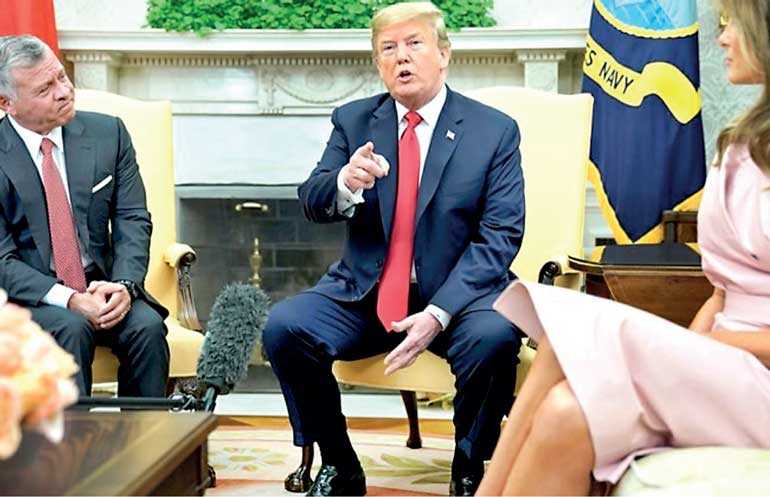Sunday Mar 01, 2026
Sunday Mar 01, 2026
Wednesday, 27 June 2018 00:00 - - {{hitsCtrl.values.hits}}

US President Donald Trump speaks to reporters while meeting with Jordan’s King Abdullah in the Oval Office at the White House in Washington, US 25 June – Reuters
Washington (Reuters): President Donald Trump said on Monday that a lot of progress had been made in the Middle East, but he declined to say when the White House would release its plan for peace between Israelis and Palestinians.
Trump, during a meeting with King Abdullah of Jordan, said things had improved since he pulled the United States out of the 2015 Iran nuclear deal. European allies opposed that move.
“Things are a lot different since we ended that,” Trump said.
In an interview with a Palestinian newspaper published on Sunday, Jared Kushner, Trump’s senior adviser and son-in-law, said Washington would announce its Middle East peace plan soon and would press on with or without Palestinian President Mahmoud Abbas.
Kushner visited Jordan, Saudi Arabia, Qatar and Egypt before talks on Friday and Saturday with Israeli Prime Minister Benjamin Netanyahu.
His comments underlined gaping divisions between Washington and the Palestinian leadership that have widened since Trump recognised Jerusalem as Israel’s capital in December and moved the U.S. Embassy there, overriding decades of U.S. policy.
Palestinian officials, who want East Jerusalem as the capital of a future state, accused Kushner of trying to undermine Abbas and what they described as their leader’s moderate camp.
In the interview with Palestinian newspaper Al Quds, Kushner, who was meeting with leaders in the region but not Abbas, refused to go into details on his peace plan.
The U.S. plan is expected to propose solutions to core issues in dispute between the Israelis and Palestinians, such as borders, the future of Israeli settlements, the fate of Palestinian refugees and security.
Israel captured the West Bank, East Jerusalem and Gaza Strip in the 1967 Middle East war. Israeli forces and settlers pulled out of the Gaza Strip, now controlled by Abbas’ main rival, the Islamist Hamas group, in 2005. U.S.-brokered peace talks collapsed in 2014.